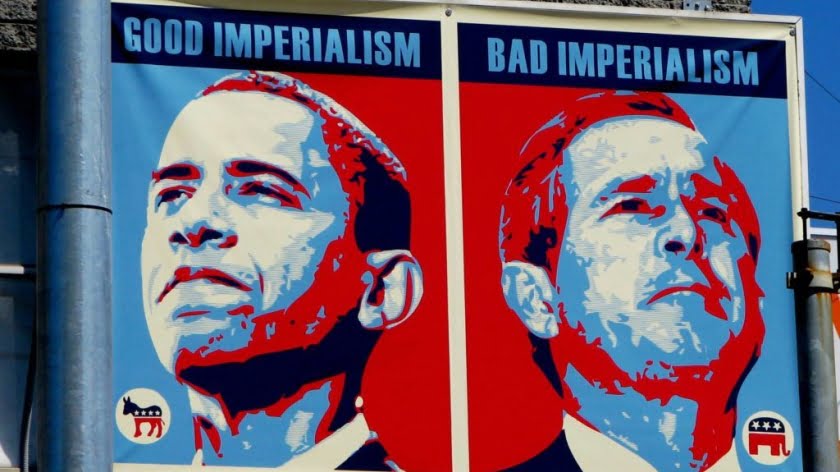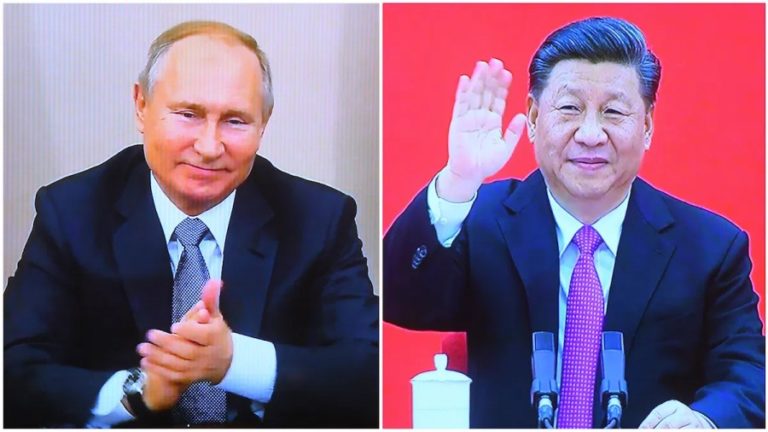The Globalists of Left & Right
In a previous article of mine [The Neo-Malthusian New Deal], I linked to Wolfgang Streeck’s review essay on ‘Globalists: The End of Empire and the Birth of Neoliberalism’ by Quinn Slobodian. By condensing and summarizing the arguments of these two scholars, and giving my own thoughts on these grave matters, I hope to make the reader understand who contributed the bricks & mortar for the scheme known as globalization and how the left and right strive to achieve the same thing, the Feudal Dominion of International Shareholders.
From the very beginning, the ideological ambition was global and universal; the distinct, the particular, the unique, like customs, nationhood, and sovereign states, was and still is considered a threat to the grand design of a Weltwirtschaft [world economy] without borders, which was expected to restore the golden age of unfettered 19th century liberalism. The empires of free trade fell in 1918 and were replaced by a host of sovereign and potentially democratic nation states, which carried the prospect of ‘economic nationalism,’ a dangerous virus in the eyes of the globalists. After 1945 decolonization started and the introduction of majority voting in the UN General Assembly was introduced; these two anti-liberal political architectures, together with the Keynesian gospel of national self-sufficiency, threatened not just economic progress but the ‘open society, human freedom, and dignity,’ so it was claimed…
The new culture in which the globalists planted their seeds of ambition was called neoliberalism. This ideology was both opposed to nation states, and, at the same time, dependent on them for its very existence. It opposed the sovereign nation state as a vehicle for change, for such a vehicle has inherent tendencies to contain and or distort markets [the market being a creation of the state, though they would never admit it openly]. On the other hand, neoliberalism is dependent on the sovereign’s capacity to fend off and suppress the public’s demand for social security, which would de-liberalize the economy. I can think of no better example of such ideological thinking than Alex Jones. When referring to the New Zealand shooter’s “responsible markets” demand in his manifesto, Jones equated the adjective “responsible” with “controlled,” in his attempt to paint the criminal as a socialist, a left-winger. Going back to neoliberalism, its purpose was and is to weaken the nation state as an instrument of mass, popular will, while strengthening it as a bulwark against the ‘illiberal dispositions’ of the public – in other words, to paraphrase James Madison, the state’s role is to protect the opulent few [the rent-seekers] from the rest of humanity, from the well-organized majority to be more precise.
Democracy spreads the expectation of a more or less egalitarian outcome, some sort of real socio-economic gains for the many [likely in detriment to the ultra rich minority] – therefore, democracy had to be implemented in such a way as to prevent its entry into the realm of the economy. The state was to only patrol and enforce the institutional limits. Beyond those limits, democracy couldn’t enter – otherwise no chance for a free market; and of course, their free market idea was a bastardized version of Adam Smith’s, because Smith was referring to “free” as in free from rent-seeking. In the same spirit of sophistry, what’s commonly referred today as Keynesianism is actually the bastardized version of Keynes’ theory, popularized by Paul Samuelson and his ilk.
Friedrich Hayek cooked up constitutional designs for a democracy that couldn’t touch the economy. Mayhaps ridiculed at the time, Hayek’s institutional views of [pseudo] free markets and castrated nation states prevailed. Today, we hear the old, liberal rhetoric of the centrist-globalist factions alongside their mass media outlets, which rails against the evils of populism [ideas that resonate with ordinary people] – evil populism that will subvert the neoliberal market and the ‘freedoms’ which come with it. These freedoms are: 1) the free flow of goods, 2) the free flow of services, 3) the free flow of [financial] capital, 4) the free flow of labor. John Maynard Keynes maintained that the unrestricted [unregulated] flow of international capital endangers the self-governing experiment we call democracy. This the globalists knew and schemed for…
The globalists always knew that capitalism with democracy would result in state intervention, a majority of the population desiring to point the economy in a certain direction. They understood that democracy, inevitably national, can coexist with capitalism so long as democratic politics is restricted to the realm of traditional beliefs and customs, not accompanied by clear-cut interests of class or country. Cultural warfare was fine and desirable, as long as free trade and private property remained sacred. Neoliberalism didn’t mean disconnecting the state from the market, but, as Slobodian observed, “encasing” capitalism in state-policed institutions, where democracy had no access. In other words, an ideological and institutional bubble was created, a perpendicular realm erected on top of a society powerless to act or react to this realm.
Slobodian describes the history of neoliberalism, of its doctrine and politics, as that of a group of extraordinary people — the globalists, thoroughly ‘networked’ in an era in which networking had not yet been invented. Renewing itself over three generations, the group held together from the end of WW1 (1918) to the creation of the World Trade Organization (WTO) in the 1990s, the new peak or return of the former zenith of international capitalism.
The globalizers were both academics and business men, but academics who understood that a theory can become historically true only if it is connected to the commanding heights of politics and the economy. In Mont Pelerin, Hayek assembled his sponsors and followers for his battle against Keynesianism and social democracy. Slobodian refers to these men as the ‘Geneva School,’ who sought to infiltrate the ranks of institutional power, mass media, and public awareness in their quest to make the world liberal again. The globalists took the long view and didn’t break when they faced ridicule, opposition, or failures. They were a peculiar group, slowly turning into a church of so-called organic intellectuals. During the ’70s, international capitalism began dismantling the post WW2 economic architecture. This architecture – ugly to the globalists due to things like government buffer stock policies, government owned public utilities, jobs programs, and a regulated financial system – produced the following results in the United States, as noted by Marriner Eccles in 1951.
“Unlike some countries that I could name, where the rich have been getting richer and the poor have been poorer, our own development during the past two decades has been just the opposite. […] We have gone far toward bringing about a more equitable distribution, than was the case 20 years ago, of the goods and services which we as a nation can produce. […] In 1929 the highest 5 percent of all income recipients obtained 34 percent of the total national income, while, at the present time, they received but 18 percent of the total. […] Meanwhile, the share of total income received by those in the lower income classes has increased proportionately. […] This means that we have in the years since 1929 accomplished one of the great social revolutions of history, a revolution that has developed gradually and has been, and will continue to be of great benefit to our entire nation.”
The globalist sect organized on all levels: seminars, meetings, university departments, collective publications, gave prizes for the young, made connections with sponsors while themselves bankrolling whoever might at some point prove worthy of recruitment. Dissent on theory was allowed, so long as such divergence didn’t imply differences in practice, and their theories were made flexible. With careful and sustained efforts, the Geneva globalists steered a huge number of institutions across the entire Western world — like the Rockefeller Foundation in New York, to the GATT [The General Agreement on Tariffs & Trade] in Geneva. Through these outlets, the globalists waged their war on the nation state [democratic or otherwise], which still threatened their influence over the economy.
Early on, the Right understood the full implications of the fundamental conflict between capitalism and democracy while parts of the Left were still dreaming of an international capitalism with a social dimension or human face to it. West Germany’s ordoliberals, like Franz Bohm and Wilhelm Ropke, were a major force on the international, globalist stage. They were tenacious neoliberals, contributors to the rise of anti-New Deal currents in the United States as early as the 1950s. In fact, Ludwig von Mises, one of the great theoretical economists of his age, was heavily involved in the concoction of the neoliberal blight. Hypocritically, the staunch market-liberal Mises died of old age in ’73, in New York, in the same rent-controlled apartment on the Upper West Side he had lived in for decades.
The globalists saw the European Union, in its successive incorporations, as a model of how to tame the democratic nation state through a legally enshrined supranational market, one with guaranteed property rights and an anti-interventionist competition law. Combining isonomy [equality of political rights] and supra-national law, the model was to be enforced by an international court, thereby circumventing national legal and political institutions, rendering them impotent. All these efforts were very much in line with the Hayekian federation project of the 1930s and 1940s. Slobodian clearly explains how extensive and future-orientated the neoliberal project was from the late ’30s. When German ordoliberals went to Brussels to help design the legal and institutional architecture of an integrated Europe, they were able to bring with them carefully thought-out institutional blueprints, incomprehensible in scope and consequence to many of those outside this refined cabal.
One case in point, among many, is the astonishing continuity and inner coherence of the life’s work of a true polymath like Friedrich Hayek. He was involved in the Viennese debates of the 1920s on socialist planning and its limits. Joseph Schumpeter and Karl Polanyi also participated in those debates. They continued in the ’30s, on the eve of World War II, as Hayek wrote about international federations that were to secure world peace and safely enshrine a liberal economy – albeit this latter aspect would be disguised as a byproduct of the integration. Shortly before this, Hayek had dissociated himself from Konjunkturforschung (the econometric and mathematical study of the business cycle), which he found too akin to Keynesian ambitions to ‘steer’ the economy. By doing this, he gave a clear message that Keynes was clueless about economics. Sadly for Hayek, as empirical analysis shows, it was the other way around.
As Slobodian writes, Hayek himself declared the capitalist market economy to be ‘sublime’ and beyond human comprehension, something to be left to itself – and if one interfered with it, many evils could be unleashed upon the world. This type of mysticism is not new in the history of Mankind. The early Islamic economists argued the same, in order to keep the Sultan from meddling in the affairs of the bazaar. Like Paul Samuelson confesses in this very short clip, which I encourage the reader to watch, it’s all about the establishment’s use of superstitions to control the narrative. Hayek developed wide-ranging, utopian ideas about the right kind of political institutions for [neo]liberal political economies, institutions designed to keep politics away from markets and protect the unknowable economy from the intervention of the uneducated and under-educated masses who wanted a better social contract than that offered by the establishment.
We’ll go back to Hayek in a moment, but to better understand the difference in means and the equality of ends, I must contrast the Geneva globalist approach to that of the bolsheviks. I will cite from the book/Manifesto, Der Geist des Militarismus, Stuttgart 1915, by Nahum Goldmann [a leading Zionist and founder of the World Jewish Congress], from the English translation housed in the collection of the Leo Baeck Institute, p.37 – 38.
“The historical mission of our world revolution is to rearrange a new culture of humanity to replace the previous social system. This conversion and reorganization of global society requires two essential steps, firstly the destruction of the old established order, secondly, the design and imposition of the new order, the first stage requires elimination of all frontier borders, nationhood and culture, public policy, ethical barriers and social definitions. Only then, the destroyed old system elements can be replaced by the imposed system elements of our new order.
The first task of our world revolution is destruction. All social strata and social formations created by traditional society must be annihilated. Individual men and women must be uprooted from their ancestral environment, torn out of their native milieus, no tradition of any type shall be permitted to remain as sacrosanct. Traditional social norms must also be viewed only as a disease to be eradicated. The ruling dictum of the new order is, nothing is good so everything must be criticized and abolished. Everything that was must be gone.
The forces preserving traditional society are “free market capitalism” in the social economic realm, and “democracy” in the mental political realm. The capitalist free market does not fight against the old economic order, nor does democracy lead a fierce hot battle against the forces of reaction which oppose the new order, therefore our transformative work will be imposed through the unifying principle of the militaristic spirit, the negative task of destroying the old established order will be completely solved and finished only when all the human masses are all forcibly collectivized as uniformed soldiers under imposed mass-conformity of new order culturing.
After destruction of the old order, construction of the new order is a larger and more difficult task […] We will have torn out the old limbs from their ancient roots in deep layers, social norms will be lying disorganized and anarchic so they must be blocked against new cultural forms and social categories naturally re-emerging. The general masses will have been first persuaded to join as equals in the first task of destroying their own traditional society and economic culture, but then the new order must be forcibly established through people again being divided and differentiated only in accordance with the new pyramidal hierarchical system of our imposed global monolithic new world order.”
With the above paragraph in mind, let’s return to Hayek. The man arrived at his theory of ‘complexity’, drawing on neuropsychology and general systems theory. As far as he was concerned, this delivered the ultimate proof of the levity and uselessness of any collective human attempt to intervene in the course of history, economic or otherwise, with the exception, obviously, of himself and his Mont Pelerin Society comrades. Complexity theory, as understood by Hayek, defended an aristocratic social order, those at the top being the only ones that mattered. While Hayekianism has long become the working hypothesis of neoliberalized capitalism, Slobodian’s great merit is that he helps us see the connection between the admirable scholarship, and the sinister political plot behind it. Hayek’s theory of complexity was conceived to frustrate the adepts of state interventionism [be they marxists or non-marxists] and ensure that the world continued to operate according to the market principle of cumulative advantage, as summed up in the bible of all places, “For whoever has will be given more, and they will have an abundance. Whoever does not have, even what they have will be taken from them.” (Matthew 25: 29). This, Hayek believed, and the neoliberals dutifully took from him, was still far better than social-democratic tampering with the mysteries of a hyper-complex global capitalism. The founder of the Austrian School of Economics, Carl Menger, didn’t have such ridiculous and esoteric beliefs regarding society. In fact, Menger was infinitely more sensible when it came to the state’s role in the economy. His view is summarized below…
“Government thus has to intervene in economic life for the benefit of all not only to redress grievances, but also to establish enterprises that promote economic efforts but, because of their size, are beyond the means of individuals and even private corporations. These are not paternalistic measures to restrain the citizens’ activities; on the contrary, they furnish the means for promoting such activities; furthermore, they are of some importance for those great ends of the whole state that make it appear civilized and cultured. Important roads, railways and canals that improve the general well-being by improving traffic and communication are special examples of this kind of enterprise and lasting evidence of the concern of the state for the well-being of its parts and thereby its own power; at the same time, they constitute major prerequisites for the prosperity of a modern state. The building of schools, too, is a suitable field for governmentto prove its concern with the success of its citizens’ economic efforts.” Carl Menger’s Lectures to Crown Prince Rudolf of Austria (ed. by Erich W. Streissler and Monika Streissler; trans. Monika Streissler and David F. Good), E. Elgar, Aldershot.
As we can see, the Mont Pelerin method of destroying sovereignty, democracy, and nationhood is far more tactful, suave, and intellectual compared to the brutal ways of the bolsheviks. And less we forget, the opposite of feudalism is nationalism, which is why, in the beginning of the article, I described the phenomenon as the Feudal Dominion of International Shareholders.
The beauty, I think, of the so-called free market [free for rent-seekers, usurers, and private cartels] is that it’s so fantastical, it ignores history and even double-entry bookkeeping. The religion of the free market is based on three core lies. They conflated land with capital. They conflated money [records of debits and credits] with commodities [like gold, grain, wool etc]. They conflated the government/state with any other household or corporation, claiming it has the same financial limits. These myths have been thoroughly debunked by many people across time and across the political spectrum [here’s one example] – but they are called zombie myths for a reason, because they refuse to die… It’s because we are indoctrinated with these false ideas from early childhood, 24/7, which makes it very difficult for the individual to unlearn these lies and replace them with the truth or something closer to the truth. When people become aware that their entire belief system is based on lies [shattered assumptions], most simply refuse to uninstall the faulty OS from their brain and just close themselves off to anything remotely heterodox in nature.
The Left rallies behind a ‘no border’ program it believes to be anti-capitalist, unaware or unwilling to recognize that the abolition of the nation state is a dream that their political counterparts held long before them. The overriding goal of the globalists was to abolish, if not the nation state completely, then its political capacity to govern itself, by exposing it to a competitive world economy with safely enshrined property rights, rights more akin to privileges, due to the deliberate conflation of Land [the Natural Commons] with Capital [the product of spent Labor], creating in effect a system of cartelized, rentier markets and an ideology of neo-feudalism. Anything that could provoke popular opposition to this had to take second place. If immigration on a large scale threatened to wake up sleeping dogs [mass movements], the globalists didn’t push it. This restraint had pragmatic reasons behind it, in the logic that competition in global markets for goods, services, and capital sufficed to do the trick and reduce nation states to mere regions in which some colorful flags with national inscriptions are waved. Failing this, immigration across open borders as a universal human right under international law was kept in reserve as another tool to soften up national solidarity by importing the international market for labor into the national political economy.
When it came down to the capitalist basics, the practical men from the MPS [Mont Pelerin Society] not only abandoned ‘racist’ objections to ‘multiculturalism’ and the like, but denounced them with much the same rhetoric as their apparent opponents on the radical Left. It’s important to note that the Mont Pelerin Society, the Frankfurt School, Post-Modernism, and other groups/currents like them [on the right and left] were heavily funded by Western oligarchs and Western Secret Services. Frances Stoner Saunders makes it abundantly clear in his book, The Cultural Cold War: The CIA and the World of Arts and Letters. The goals were fairly simple – substitute class interests and class antagonism with cultural, racial, gender, and sexuality issues, preach false solutions, and demoralize the population [the working class in particular].
Wolfgang Streeck ponders the following… Can the freedom of movement of labor [the fourth of the four trans-national freedoms of the neoliberal utopia] still be pushed while the other three are being pulled back into the confines of democratic, national politics? This also raises the issue of whether socially and economically mixed countries exposed to unfettered immigration [and migration] can muster the political will to fight internal inequality by protecting their societies from the vagaries of global markets. Is a country able to re-establish the national economic system without having control over its own immigration policy?
Wilfully neutered academics have engaged in mental gymnastics and fancy equations to come up with things like multi-level government, global governance, public choice, complexity, subsidiarity etc, taking them seriously on their face value and turning them into fashionable intellectual toys of a shallow social science, entirely unperturbed by its political irrelevance. Here there was a clear vision, a desire to make history through domesticated academics, simultaneously free and cut off from political and social responsibility. Compared to Slobodian’s globalists, the army of political scientists that specialized, mostly with funding from Brussels, in debating things like inter-governmentalism vs neo-functionalism, must appear hopelessly out of touch with the real world. But the globalists of Geneva and the Mont Pelerin Society and their audience understood what they were talking about, so well in fact they didn’t always have to be explicit about it, whereas their academic mouthpieces had no idea from which source their daily bread came. Taken out of context, however, these concepts became entirely arbitrary; they could mean whatever meaning one attributed to them. To avoid suspicion and criticism, euphemistic jargon was employed to wash out any association with capitalism – things like ‘integration’ and ‘social dimension’…
A better life for all, now or later, was enshrined in the so-called four freedoms: 1) the free flow of goods, 2) the free flow of services, 3) the free flow of [financial] capital, 4) the free flow of labor. The ‘no-borders’ Left wants to suspend the first three and keep the fourth. The economic nationalists wish to suspend all four. The liberal-dems wish to keep the first three and suspend the fourth. While the neoliberals want to keep all four. I wrote a while back on the fourth element in an article called Historical and Socialist Views on Immigration.
Capitalism was for the [mainstream] economists a sublime realm of esoteric mathematics. In contrast, the globalists had long given up on such mysticism, using the economic profession simply as a tool for propaganda to convince the dirty masses of what their ‘true needs’ were; the dictums were simple – tighten your belt if you wish to prosper – privatizing profits and socializing losses is good for the economy – usury and rent-seeking are “normal” economic activity… But the globalists had moved on to the realm of laws and political institutions, engineering the supreme instruments with which to castrate politics. Sovereign, democratic states were dangerous for them, because through these vehicles the mass of humanity would command greater bargaining power, to the detriment of the opulent minority. As such, the globalists had to turn the state vehicle into the great protector of [rentier] capitalism.
Yet hope remains and it comes from the East… I will end with this statement from April made by Russia’s Foreign Minister Sergey Lavrov: “The Western liberal model of development, which particularly stipulates a partial loss of national sovereignty – this is what our Western colleagues aimed at when they invented what they called globalization – is losing its attractiveness and is no more viewed as a perfect model for all. Moreover, many people in the very Western countries are skeptical about it.”
By Serban V.C. Enache
Source: Hereticus Economicus







